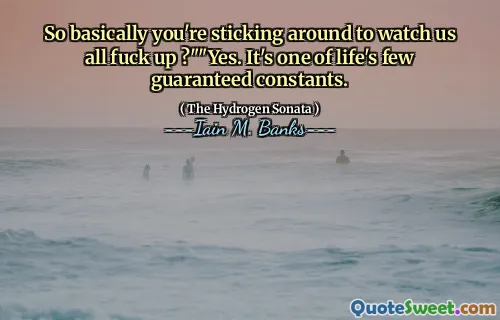Nice people who are beginning to live to a great age - as it were - react with such revulsion to the burgeoning horrors that confront them, they generally prefer suicide. It's only us slightly malevolent types who are able to survive that realisation and find a kind of pleasure - or at least satisfaction - in watching how the latest generation or most recently evolved species can re-discover and beat out afresh the paths to disaster, ignominy and shame we had naively assumed might have become hopelessly over-grown.
In Iain M. Banks' "The Hydrogen Sonata," the narrative reflects on the reactions of well-intentioned individuals facing the harsh realities of life as they age. It suggests that many of these "nice people" are so overwhelmed by the increasing horrors of existence that they may choose to end their lives rather than confront the disillusionment that comes with their situation. This reaction highlights a profound revulsion to the world's unfolding chaos and despair.
In contrast, the author posits that those with a more cynical or malevolent outlook are better equipped to survive this grim realization. Instead of succumbing to defeat, they find a perverse sense of enjoyment or satisfaction in observing how newer generations continuously rediscover pathways to failure and shame. This perspective emphasizes a stark divide in human responses to societal decline, revealing a darker understanding of resilience and the cyclical nature of human folly.






